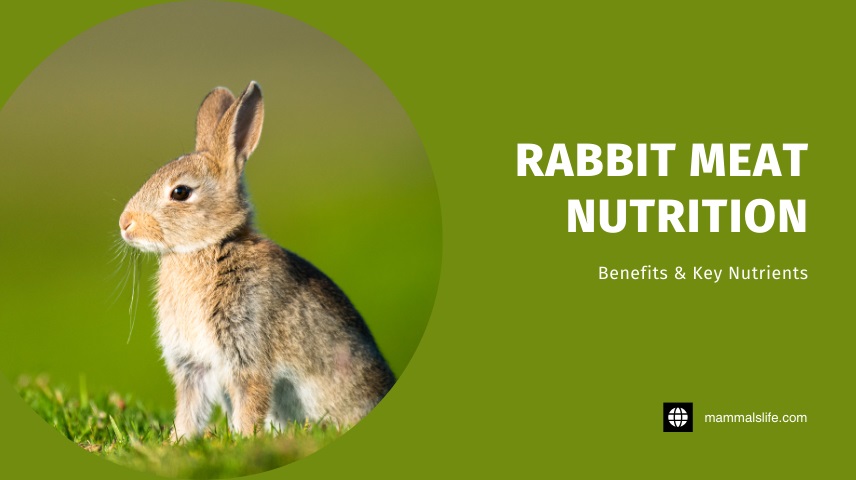Last Updated on February 22, 2025 by Mammals Life
Rabbit meat is low in fat and high in protein. It provides essential nutrients like vitamins B12 and E, iron, and selenium.
Rabbit meat is a healthy and lean protein source. It offers various essential nutrients, making it a valuable addition to any diet. With its high protein content and low fat levels, rabbit meat can aid in muscle growth and weight management.
It is rich in vitamins B12 and E, which support nerve function and protect cells from damage. The iron content in rabbit meat helps in the formation of red blood cells, while selenium boosts the immune system. Its delicate flavor and tender texture make it a versatile ingredient in many recipes. Rabbit meat is also environmentally friendly, requiring less feed and water compared to other livestock.
Rabbit Meat Nutrition – Benefits and Nutrients
Rabbit meat nutrition offers a variety of health benefits due to its unique nutritional profile. Known for being a lean protein source, rabbit meat is packed with essential vitamins and minerals. This nutritious meat is gaining popularity among health-conscious individuals. Let’s dive into the various aspects of rabbit meat nutrition.
Rabbit Meat As A Lean Protein
Rabbit meat is an excellent source of lean protein. It provides high-quality protein with fewer calories compared to other meats.
- Low in fat: Rabbit meat contains only about 2.3 grams of fat per 100 grams.
- High in protein: It offers around 21 grams of protein per 100 grams.
- Low in cholesterol: With about 57 mg of cholesterol per 100 grams, it’s lower than chicken and beef.
Here’s a comparison table of protein content per 100 grams of various meats:
| Meat Type | Protein (g) | Fat (g) | Calories |
|---|---|---|---|
| Rabbit | 21 | 2.3 | 173 |
| Chicken | 20 | 3.6 | 165 |
| Beef | 26 | 15 | 250 |
Key Nutrients Found In Rabbit Meat
Rabbit meat is rich in essential vitamins and minerals, making it a nutritious choice.
- Vitamin B12: Crucial for red blood cell formation and neurological function.
- Iron: Important for oxygen transport in the blood.
- Phosphorus: Supports healthy bones and teeth.
- Selenium: Acts as an antioxidant and supports thyroid function.
Below is a breakdown of key nutrients per 100 grams of rabbit meat:
| Nutrient | Amount | % Daily Value |
|---|---|---|
| Vitamin B12 | 0.5 µg | 21% |
| Iron | 3.2 mg | 18% |
| Phosphorus | 190 mg | 27% |
| Selenium | 12.2 µg | 22% |
Health Benefits Of Eating Rabbit Meat
Eating rabbit meat offers numerous health benefits:
- Supports muscle growth: High protein content helps build and repair muscles.
- Aids weight management: Low in calories and fat, ideal for weight loss.
- Boosts metabolism: Rich in B vitamins that help convert food into energy.
- Improves heart health: Low cholesterol and high selenium levels support heart health.
Rabbit meat is also easy to digest, making it suitable for people with digestive issues. Its high nutrient density supports overall health and well-being.
Sustainability And Environmental Benefits
Rabbit farming is more sustainable than traditional livestock farming. It requires less land and water.
- Low environmental impact: Rabbits produce fewer greenhouse gases than cattle.
- Efficient feed conversion: Rabbits convert feed into meat more efficiently than other livestock.
- Less land use: Rabbit farming requires significantly less space.
Rabbit farming can also support local economies and reduce dependency on large-scale meat production. This makes it an environmentally friendly and sustainable choice.
Rabbit Meat In Low-calorie And Weight-loss Diets
Rabbit meat is an excellent option for low-calorie and weight-loss diets:
- Low in calories: Only 173 calories per 100 grams.
- High in protein: Keeps you full longer and reduces hunger cravings.
- Low in fat: Helps in managing body weight and reducing fat intake.
Incorporating rabbit meat into a balanced diet can help achieve weight loss goals. Its high protein content supports muscle maintenance while reducing overall calorie intake.
Cooking With Rabbit Meat: 3 Healthy Recipe Ideas
Here are three healthy rabbit meat recipes:
- Grilled Rabbit Skewers: Marinate rabbit pieces in olive oil, garlic, and herbs. Skewer and grill until cooked through.
- Rabbit Stew: Slow-cook rabbit with vegetables, broth, and spices. Serve with whole grains for a hearty meal.
- Rabbit Salad: Mix cooked rabbit meat with leafy greens, tomatoes, cucumbers, and a light vinaigrette.
These recipes are nutritious and easy to prepare, making rabbit meat a versatile addition to your diet.
Frequently Asked Questions
Is Rabbit Meat Healthy To Eat?
Rabbit meat is low in fat and high in protein, making it a nutritious choice for a balanced diet.
What Vitamins Are In Rabbit Meat?
Rabbit meat contains B vitamins, including B12, along with essential minerals like iron, zinc, and potassium.
How Many Calories In Rabbit Meat?
A 3-ounce serving of cooked rabbit meat has approximately 147 calories, making it a low-calorie protein option.
Is Rabbit Meat High In Protein?
Yes, rabbit meat is high in protein, providing about 28 grams per 3-ounce serving, which supports muscle growth.
Does Rabbit Meat Contain Cholesterol?
Rabbit meat has moderate cholesterol levels, around 70 mg per 3-ounce serving, lower than other red meats.
Conclusion
Rabbit meat offers impressive nutritional benefits, making it a healthy choice. It’s lean, rich in protein, and low in fat. Including rabbit meat in your diet can enhance overall wellness. Consider adding this nutritious option to your meals for better health.
Discover the unique advantages rabbit meat can bring to your table.








